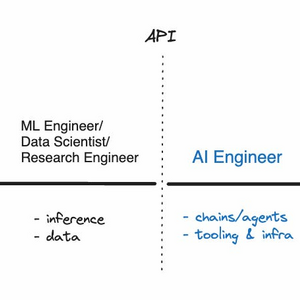
I take this seriously and literally. I think it is a full time job. I think software engineering will spawn a new subdiscipline, specializing in applications of AI and wielding the...
Show More
Mentions
See All
Andrej Karpathy @karpathy
·
Jun 30, 2023
I think this is mostly right.
- LLMs created a whole new layer of abstraction and profession.
- I've so far called this role "Prompt Engineer" but agree it is misleading. It's not just prompting alone, there's a lot of glue code/infra around it. Maybe "AI Engineer" is ~usable, though it takes something a bit too specific and makes it a bit too broad.
- ML people train algorithms/networks, usually from scratch, usually at lower capability.
- LLM training is becoming sufficently different from ML because of its systems-heavy workloads, and is also splitting off into a new kind of role, focused on very large scale training of transformers on supercomputers.
- In numbers, there's probably going to be significantly more AI Engineers than there are ML engineers / LLM engineers.
- One can be quite successful in this role without ever training anything.
- I don't fully follow the Software 1.0/2.0 framing. Software 3.0 (imo ~prompting LLMs) is amusing because prompts are human-designed "code", but in English, and interpreted by an LLM (itself now a Software 2.0 artifact). AI Engineers simultaneously program in all 3 paradigms. It's a bit 😵💫